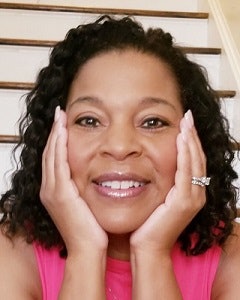When National Association of Black Counselors (NABC) co-founders Tamara Ferebee and Dr. Faye Barner launched the organization this past November, it was out of a need for a supportive, professional community geared specifically to the Black counselor identity.
 Tamara Ferebee
Tamara FerebeeWith more than 100 members and growing, NABC’s vision is to ensure that all counselors “possess the knowledge, attitude and skills to ensure that the mental health needs of the African American community and the African diaspora are competently attended to and addressed for the individual and the collective.”
The co-founders are now working to grow the organization, further its legislative advocacy and professional development offerings, and notably, bring in paraprofessionals who disproportionately provide mental health services to Black children and families, they say.
“Up until this point, there has not been a professional organization specifically slated for Black counselors and for the Black counseling profession,” Ferebee told Diverse. “We are looking to expand and provide services, which is different than a lot of other professional organizations. We [also] hope to expand to be able to provide a platform for people to be able to submit research and publish.”
Ferebee, NABC’s executive director of Human Services Administration and a licensed professional counselor who has been practicing for more than 20 years, said Black counselors make up only 10 to 15 percent of professional counselors.
“In mental health professions, period, it’s low. Because of that, it’s hard to find us,” she said. “We’re trying to specifically increase the number of Black professionals that come into the field.”
Some of the initiatives NABC plans to introduce to increase the number of Black counseling professionals include a mentor-mentee program.
“We want young counselors to have someone there that can answer their questions,” Ferebee said. “I think it’s important to pass along that wisdom and knowledge so they don’t make the same mistakes we did. Also, teaching them what’s important as it lies ahead and teaching them to forecast what’s going to be happening in the field is important.”
Another NABC initiative would assist students through school and their residency programs – as part of a student division. The program would also help aspiring counselors identify institutions that hold accreditation with the Council for Accreditation of Counseling & Related Educational Program (CACREP), Ferebee said.
“One of the shifts that we’re seeing is that the counseling field is now starting to ask everybody to have CACREP accreditation behind them,” she said. “Depending on your institution, you may or may not have CACREP accreditation right now.”
For students at historically Black colleges and universities or other schools that do not have this accreditation, it can serve as a barrier to becoming licensed and paid as a counselor, Ferebee said. For this reason, NABC has an additional goal to help HBCUs work towards securing a CACREP accreditation by connecting Black counseling consultants to HBCUs in order to evaluate their counseling programs.
Broadly, the co-founders note that there are opportunities for current and aspiring Black counselors to become involved with NABC. The organization is looking to establish itself locally, at the state level, regionally and nationally, with opportunities for schools, for instance, to partner and develop chapters.
NABC currently has sixteen divisions, with plans to adjust as the needs of members evolve. There are divisions for counselors working in the fields of correctional health, marriage and family, men, students and residents, LGBTQIA, addiction treatment and recovery, faith and spirituality and more.
A specific division for paraprofessionals is one that the co-founders say is particularly important because they disproportionately provide a “lion’s share” of mental health services to Black children and Black families.
“Paraprofessionals tend to be the ones providing the lion’s share of mental services to Medicaid populations, but they are largely unmonitored and it’s no one really training or policing paraprofessionals,” Ferebee said. “They’re providing mental health services disproportionally to Black children and Black families. We want to bring them under our auspices and … give them an opportunity to have access to professionals that speak to the services they are providing.”
And on the legislative front, the association will be advocating for similar issues taken up by organizations like the American Counseling Association. A major advocacy priority will be giving counselors access to Medicare and Medicaid.
“When people have Medicare, they can’t come to us,” Ferebee explained. “We are lobbying as a profession to get into Medicare. When you talk about the Medicare population, you’re talking about those who have disabilities, you’re talking about older folks, you’re talking about much more vulnerable populations that are being cut off basically. We are not an option for them for mental health [services.]”
NABC will similarly advocate for better military mental health, awareness around suicide prevention and gun control advocacy, given their impact on people of color, Ferebee added.
“Anything that we do to increase our availability to [this population] will have an impact,” she said.
Tiffany Pennamon can be reached at [email protected]. You can follow her on Twitter @tiffanypennamon.


















